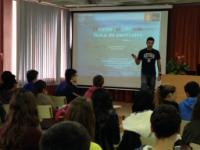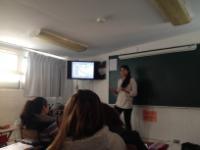oPAC fellows hit the classroom
After almost three years doing research abroad, some of the oPAC fellows are going back to their academic roots to share the experience with schoolchildren from their own countries, and perhaps relive some memories of their childhood.
 Héctor García Morales, from Royal Holloway University of London, visited three secondary schools around the Barcelona area, and he is planning to visit two more schools in the following weeks. His talk about CERN, the LHC and the origins of the Universe, caused a great deal of amazement among the students. “They were a great experience and a funny time!” says Héctor.
Héctor García Morales, from Royal Holloway University of London, visited three secondary schools around the Barcelona area, and he is planning to visit two more schools in the following weeks. His talk about CERN, the LHC and the origins of the Universe, caused a great deal of amazement among the students. “They were a great experience and a funny time!” says Héctor.

 Daria Astapovych, from CERN, visited a high school in Sumy, Ukraine. She gave a talk about the importance of particle accelerators to study the Universe, highlighting in particular the CERN project. An interesting discussion followed the talk about the origins of the Universe, dark matter, the standard model, and applications of accelerators, demonstrating the far reaching implications of the research carried out with particle accelerators. Perhaps too far-reaching as shown by a student who posed the dreaded question: “Are you sure that you won’t create a black hole at CERN?”
Daria Astapovych, from CERN, visited a high school in Sumy, Ukraine. She gave a talk about the importance of particle accelerators to study the Universe, highlighting in particular the CERN project. An interesting discussion followed the talk about the origins of the Universe, dark matter, the standard model, and applications of accelerators, demonstrating the far reaching implications of the research carried out with particle accelerators. Perhaps too far-reaching as shown by a student who posed the dreaded question: “Are you sure that you won’t create a black hole at CERN?”
These talks, and the ensuing debates, have demonstrated that teenage students may show a keen interest on accelerator science if presented in an attractive manner. “It's so important to arouse interest of young and talented people in the nature science! That's why the presentation was about a rather new field in physics – Accelerator physics, which could help to understand the world order and many other interesting things” says Daria. Sharing the excitement of scientific discovery with school children the oPAC fellows will inspire a new generation of accelerator scientists.